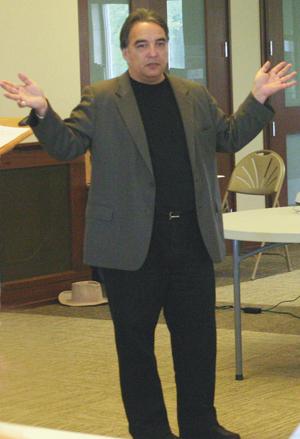
By Celine Klosterman
IOWA CITY — Forming one-on-one relationships centered on people’s personal motivations as well as a common cause are key to organizing people to impact public policy.
About 45 people heard that message May 21 during a Catholic Relief Services (CRS) advocacy team training designed to equip Catholic leaders for effective local and global Christian advocacy. At St. Patrick Church, representatives of the Davenport Diocese and parishes received practical tips on engaging people in social action and took the first steps toward forming a diocesan advocacy team.
Fear, bribes, guilt and trickery can help people organize others, but Jesus rejected such methods, Daniel Romero, CRS program officer, told participants. Instead, Catholics develop community power and influence by building relationships with people based on shared values and self-interest.
To do so, leaders must discover a person’s motivation, background and other defining traits. Romero encouraged scheduling guided, hour-long, one-on-one conversations to connect with potential advocates, maintain relationships with existing supporters, and communicate with decision-makers and members of the media.
He modeled part of a conversation with a training participant, asking about her background, family, work life and motivation and goals for her social-justice efforts. Participants then partnered to practice such conversations.
“This is the DNA of how to grow your parish team or grow a team in the diocese,” Romero said.
Relationships also play a fundamental role in politics, said Tom Chapman, executive director of the Iowa Catholic Conference. He said state legislators are accessible and encouraged training attendees to call or meet them. Fully research an issue, find allies and concisely share your view during a visit to the Capitol, at a town hall meeting or through phone calls or email, a handout he shared suggested.
The conference is currently working on issues including increasing the state earned income tax credit, increasing the tax credit for donations to School Tuition Organizations and supporting a bill to ban abortions after 20 weeks, Chapman noted.
At the international level, individuals and organizations can join Catholics Confront Global Poverty, an initiative of CRS and the U.S. Conference of Catholic Bishops. Madeline Philbin, regional director for CRS-Midwest, noted the effort focuses on international assistance, reforming global trade and agriculture policies, relieving poor nations’ debt, using natural resources in socially and environmentally just ways, climate change, migration, and peace building and diplomacy.
When discussing such issues, don’t overwhelm people by simply talking about problems, Philbin said. Share the idea that humanity is one family, focus on solutions, use statistics sparingly and put them in context, avoid jargon, and don’t be afraid to repeat your message.
Romero later asked attendees to volunteer to form a diocesan advocacy team that will meet monthly, initially with guidance from CRS; identify issues to work on; and encourage others to get involved. A dozen people volunteered.
Kent Ferris, diocesan social action director, said the team offers opportunities that Catholics in the diocese are seeking. “At deanery social action meetings, people say, ‘We want to do more than just get updates. We want to be actively involved and champion causes relating to our faith.’”
He pointed specifically to the idea of Christian advocacy, noting Catholic social teaching sets members of the Church apart from others working to shape public policy.
Romero’s advice on building relationships offers a way for any Catholics to strengthen their parishes’ social-justice efforts, he said.
Laura Anderson, co-coordinator of the Clinton Franciscan Center for Active Nonviolence and Peacemaking, said she and fellow members of the Franciscan community appreciated the training. “I think we were all very inspired and learned how to take a new look at what ‘advocacy’ really means so that we can re-focus our energies to be a part of real solutions.
“Here at the Center for Active Nonviolence and Peacemaking, we are looking forward to networking with others in the diocese on continuing efforts to confront global poverty and work towards systemic change.”
Get involved
To join or get more information about the diocesan advocacy team, contact Kent Ferris, the Davenport Diocese’s social action director, at (563) 888-4211 or ferris@davenportdiocese.org.
To take part in Catholics Confront Global poverty, visit www.crs.org/globalpoverty.
To get involved in JustFaith Ministries, which offers workshops and programs for faith communities expanding their social ministry, contact Loxi Hopkins, a volunteer in the diocese’s social action department, at (563) 888-4212 or hopkins@davenportdiocese.org, or visit www.justfaith.org.
To receive legislative updates and action alerts from the Iowa Catholic Conference, visit www.iowacatholicconference.org.








